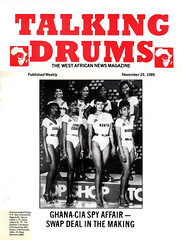Reagan and Namibia
By Linus C. Okere
Namibia was picked by the Reagan administration for special concern because the struggle there is interpreted as a Soviet design to gain influence in the Southern African region.Addressing the United Nations General Assembly on 24 October, the fortieth anniversary of the world body, President Ronald Reagan in his usual hypothetical approach to global issues, identified Angola and other areas of tension as suffering from the consequences of foreign-imposed ideology commun- ism. The ultra-conservative president omitted South Africa, a terrorist regime backed both morally and materially by the Reagan administration and Namibia, whose independence is being delayed by Mr Reagan's concept of 'linkage' - Namibia's independence is conditional upon the withdrawal of the estimated 25,000 Cuban troops from Angola.
Nothing in the president's speech indicated that he was abandoning his eccentric obsession with the communist threat, his obsessive hatred of Cuba which led him to send his uniformed men into the Commonwealth country of Grenada in the name of freedom and democracy. This obsession with communism means that the US government will continue to view global conflicts in the context of East/West relations. To understand this mechanical cold-war approach to local issues and its effect on Namibia, it is important to look at the formation of the Reagan administration's Southern African policy.
The Reagan team represents the ultra-conservatives, some of whom should by now have been confined to American museums, since they are men of the 1940s and 1950s. The team came to power with the view that the Carter administration's commitment to human rights had allowed the communists to gain a foothold in areas of strategic value to the West. A deceptive policy -'constructive engagement' - was propounded. Students of international politics of Southern Africa will, however, agree that this policy was not a new foreign policy orientation. The whole concept is reminiscent of Henry Kissinger's National Security Study Memorandum prepared in 1969, adopted in 1970 by the Nixon administration, and becoming known as NSSM39. It de- scribed most nationalist movements as 'communist stooges' and stressed the need to support white minority regimes.
Namibia was picked by the Reagan administration for special concern because the struggle there is interpreted as a Soviet design to gain influence in the Southern African region. It was this ideological insanity which led to the introduction of the 'linkage’ to Namibia's independence. As can be seen, the linkage of Namibia's independence to the withdrawal of Cuban troops in Angola reflects a blatant challenge to Angola's freedom to maintain bilateral relations with foreign countries. It was not surprising that the Reagan administration disregarded the fact that the Cubans were invited by the MPLA government to repel South Africa's invasion mounted to prevent the MPLA forces from declaring independence on 11 November 1975.
The invasion was carried out with the connivance of the Ford administration, an equally conservative government. President Piet Botha, the then Defence Minister, who in 1979 succeeded John Vorster as Prime Minister, later declared in the Cape Town parliament with anger that the United States, after encouraging them to invade, then "recklessly left us in the lurch".
Pretoria did not consider the Cuban presence in Angola as a threat to the peace process in Namibia. It only seized on this factor when the 'linkage' question was raised by the Reagan administration. The linkage question has, however, come to confirm that from the beginning constructive engagement was never meant to be constructive, but rather it was designed to be a policy of constructive collaboration, a policy aimed at sanctifying Pretoria's repressive policies in South Africa and Namibia.
Various United Nations resolutions (and especially No. 435) which have offered guidelines and called for the decolonisation of Namibia, have been defied by South Africa with the support of those professing to guarantee world freedom and democracy.
Pretoria did not consider the Cuban presence in Angola as a threat to the peace process in Namibia. It only seized on this factor when the 'linkage' question was raised by the Reagan administrationIt would be naive to believe that South Africa will withdraw from Namibia as soon as the Cubans pull out of Angola. Equally, pulling out of Angola will not prevent South Africa from using it as a punching bag. The repeal in July of the 1976 Clark Amendment which forbade covert or overt US involvement in Angola, indicates that the Reagan administration plans to internationalise the regional conflict. When offering military aid to client countries, the administration always terms it 'humanitarian aid'. Such aid is currently being considered for Jonas Savimba's UNITA.
It cannot, therefore, be ruled out that a new obstacle to Namibian independence will not be raised by Pretoria and Washington. In their own view, a regional stability will be achieved if Jonas Savimba's UNITA is included in the Angolan government. And until this is done, Namibia will remain under South Africa's 'protection', that is, bondage.
What will force South Africa out of Namibia is a combination of guerilla war, white resentment at the costly war, and external pressures. President Reagan has used the United Nations General Assembly to announce his plans for the resolution of regional conflicts. However, if his intentions are to be seen as genuine he must include areas suffering from US- inspired aggression. The only way the United States can succeed in its fight against international terrorism is by withdrawing support for undemocratic regimes.
Namibia is a territory denied freedom and self-determination, President Reagan can make us believe his commitment to these values if he drops his 'linkage' ploy and forces Pretoria to leave Namibia alone. Its presence in Namibia is colonial, while the Cuban presence in Angola is bi- lateral. A SWAPO government will undoubtedly protect Western interests as long as such interests are not in conflict with national development.
